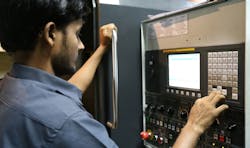Results from IEEE GlobalSpec’s fourth annual Pulse of Engineering Survey provide a number of insightful perspectives. “These findings provide an exclusive look into the mind of the engineer,” said Patrick Mahoney, CEO and President of IEEE GlobalSpec. “Industrial marketers across the globe can use this information to better target audiences, strengthen relationships with customers, develop messaging and content, and position products to align closely with customer needs and pain points as well as industry trends. At the same time, it gives organizations insight into how their engineering staff is feeling about the current state of their position, so they know how and where to give them the resources and support they need.”
Key findings from the study include:
The pressure is on
- 55% of engineers say the pace of engineering is increasing.
- 53% are required to do more with less.
- 40% say that pressure to meet deadlines is putting product quality/rework at risk.
Information is key
18% say they’re overwhelmed by information requirements, noting that the leading tools to help complete projects are:
- Technical documentation
- Software and development tools
- Product specifications
- Datasheets
Changing tech and increasing competition presents challenges
- 52% said the number of competitors is growing.
- 66% said the competitive landscape is global and competes 24/7.
- Technological advances create additional challenges.
- 49% said new technologies and companies disrupt their products/markets at a faster rate.
- 54% said that their company’s technologies were relevant for a shorter period of time.
Loyalty lies in the profession
- 37% say they are very or completely likely to be employed at the same company five years from now.
- Top reasons for moving on from a current role are to move to a different company, retirement or promotion to a senior role.
Companies need to change
- 61% say that knowledge and/or information loss as employees left the company was very or extremely important, a 16% increase over a year ago.
- 30% of companies have formal practices in place to identify senior-level and specialized experts to train, transfer, mentor, and/or manage or retain their knowledge among others in the organization.
Of the 2,236 survey respondents, taken from a pool of both Engineering360 and IEEE Spectrum registered users:
- 23% work at companies that employ 10 or fewer engineers.
- 36% work for companies employing 11-250 engineers.
- 41% work for companies with more than 250 engineers.
Respondents come from a wide range of industries, including:
- Aerospace and defense
- Engineering/tech design services
- Communications (datacom/telecom/wireless/network)
- Utilities/energy
- Semiconductor and electronics components
IEEE GlobalSpec
IEEE GlobalSpec is a community built by engineers, for engineers, that’s a source for trusted, expert engineering content, information, insight, tools, and community for engineers and technical professionals across multiple industries and disciplines. More than 8 million industry professionals rely on IEEE GlobalSpec as a resource at every stage of the research, product design, and purchasing process.
About the Author

Sam Davis
Sam Davis was the editor-in-chief of Power Electronics Technology magazine and website that is now part of Electronic Design. He has 18 years experience in electronic engineering design and management, six years in public relations and 25 years as a trade press editor. He holds a BSEE from Case-Western Reserve University, and did graduate work at the same school and UCLA. Sam was the editor for PCIM, the predecessor to Power Electronics Technology, from 1984 to 2004. His engineering experience includes circuit and system design for Litton Systems, Bunker-Ramo, Rocketdyne, and Clevite Corporation.. Design tasks included analog circuits, display systems, power supplies, underwater ordnance systems, and test systems. He also served as a program manager for a Litton Systems Navy program.
Sam is the author of Computer Data Displays, a book published by Prentice-Hall in the U.S. and Japan in 1969. He is also a recipient of the Jesse Neal Award for trade press editorial excellence, and has one patent for naval ship construction that simplifies electronic system integration.
You can also check out his Power Electronics blog.

